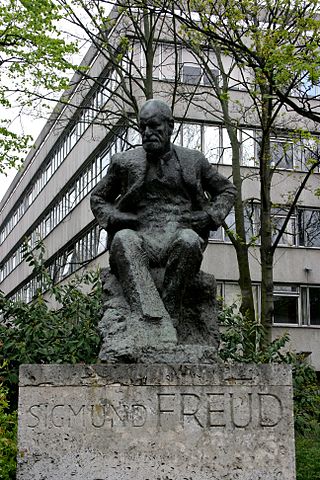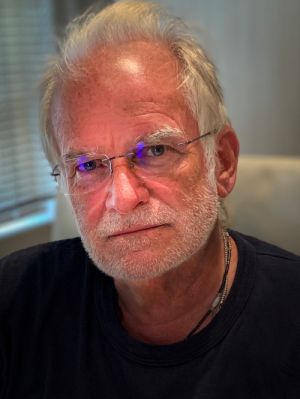Psychoanalysis is a therapeutic method and field of research developed by Sigmund Freud. Founded in the early 1890s, initially in co-operation with Josef Breuer and others' clinical research, he continued to refine and develop theory and practice of psychoanalysis until his death in 1939. It conceptualizes the human psyche as consisting of three primary instances: the id, the ego, and the superego, which interact to satisfy the instinctive needs. Creation and transmission of civilisation serves this biological processes of self-preservation and reproduction.

Alfred Ernest Jones was a Welsh neurologist and psychoanalyst. A lifelong friend and colleague of Sigmund Freud from their first meeting in 1908, he became his official biographer. Jones was the first English-speaking practitioner of psychoanalysis and became its leading exponent in the English-speaking world. As President of both the International Psychoanalytical Association and the British Psycho-Analytical Society in the 1920s and 1930s, Jones exercised a formative influence in the establishment of their organisations, institutions and publications.

The Tavistock and Portman NHS Foundation Trust is a specialist mental health trust based in north London. The Trust specialises in talking therapies. The education and training department caters for 2,000 students a year from the United Kingdom and abroad. The Trust is based at the Tavistock Centre in Swiss Cottage. The founding organisation was the Tavistock Institute of Medical Psychology founded in 1920 by Hugh Crichton-Miller.

Theodor Reik was a psychoanalyst who trained as one of Freud's first students in Vienna, Austria, and was a pioneer of lay analysis in the United States.
The International Psychoanalytical Association (IPA) is an association including 12,000 psychoanalysts as members and works with 70 constituent organizations. It was founded in 1910 by Sigmund Freud, from an idea proposed by Sándor Ferenczi.
Stephen A. Mitchell was an American clinical psychologist and psychoanalyst. His book with Jay Greenberg, Object Relations in Psychoanalytic Theory (1983), became a classic textbook in graduate schools and post-graduate institutions, providing a general overview and comparison of several psychoanalytic theories. He was considered a leader of relational psychoanalysis. Mitchell helped to create the Relational Track of the New York University Postdoctoral Program in Psychotherapy and Psychoanalysis.
The William Alanson White Institute (WAWI), founded in 1943, is an institution for training psychoanalysts and psychotherapists that also offers general psychotherapy and psychoanalysis. It is located in the Clara Thompson building of the Upper West Side of New York, New York. It was founded as a protest against the mainstream of American psychoanalytic thought, which was thought to be sterile, dogmatic, and constrictive by the psychoanalysts who founded the institute. WAWI also offers continuing education, through conferences, lectures, and symposia, and publishes Contemporary Psychoanalysis.

The American Psychoanalytic Association (APsA) is an association of psychoanalysts in the United States. APsA serves as a scientific and professional organization with a focus on education, research, and membership development.
The California Graduate Institute (CGI) was founded in 1968 as an independent graduate school specializing in psychology, marital and family therapy, and psychoanalysis. CGI and The Chicago School of Professional Psychology formally announced in fall 2008 that they were uniting. The merger was approved by The Chicago School’s accrediting body, the Higher Learning Commission (HLC), in October 2008. HLC joins the Western Association of Schools and Colleges (WASC) as two of six regional associations that accredit public and private schools, colleges, and universities in the United States.

Peter Fonagy, is a Hungarian-born British psychoanalyst and clinical psychologist. He studied clinical psychology at University College London. He is a Professor of Contemporary Psychoanalysis and Developmental Science Head of the Division of Psychology and Language Sciences at University College London and a training and supervising analyst in the British Psycho-Analytical Society in child and adult analysis. His clinical interests center on issues of borderline psychopathology, violence, and early attachment relationships. He was Chief Executive of the Anna Freud Centre in London until September 2024. His work attempts to integrate empirical research with psychoanalytic theory. He has published over 500 papers, and 270 chapters and has authored 19 and edited 17 books.
The British Psychoanalytic Council (BPC) is a UK-wide umbrella association of training institutions and professional bodies providing psychotherapy services to the public, mainly in the private sector. As implied in the title their therapeutic approaches are guided by analytical psychology and the psychoanalytic schools of psychology and treatment. It is a registered charity.
The American Academy of Psychodynamic Psychiatry and Psychoanalysis (AAPDPP) is a scholarly society including psychiatrists interested in all aspects of psychodynamic psychiatry.
The Psychoanalytic Quarterly is a quarterly academic journal of psychoanalysis established in 1932 and, since 2018, published by Taylor & Francis. The journal describes itself as "the oldest free-standing psychoanalytic journal in America". The current editor-in-chief is Jay Greenberg.

Barnaby B. Barratt is a radical psychoanalyst, specialist in human sexuality, somatic psychologist, human rights activist and practitioner of meditation in the Dharmic traditions of tantra. He has lived in England, India, USA and Thailand and he currently lives and practices in Johannesburg, South Africa. He is Director of Studies at the Parkmore Institute.

Nancy McWilliams, Ph.D., ABPP., is emerita visiting professor at the Graduate School of Applied and Professional Psychology at Rutgers University. She has written on personality and psychotherapy.
Therese Benedek was a Hungarian-American psychoanalyst, researcher, and educator. Active in Germany and the United States between the years 1921 and 1977, she was regarded for her work on psychosomatic medicine, women's psychosexual development, sexual dysfunction, and family relationships. She was a faculty and staff member of the Chicago Institute for Psychoanalysis from 1936 to 1969.
The International Institute of Depth Psychology (IIDP) is a private higher educational establishment in Kyiv, Ukraine. It specializes in psychoanalytic education, including theoretical psychoanalytic education, psychoanalytic training and supervision support for the beginning of practical psychotherapeutic activities.
The New Center for Psychoanalysis is a psychoanalytic research, training, and educational organization that is affiliated with the American Psychoanalytic Association and the International Psychoanalytic Association.
Psychoanalytic institutes and societies in the United States are often linked together, though a distinction may be made between the functions of the institutes and the societies. Some local psychoanalytic organizations have both words in their title while others have only one or the other.






